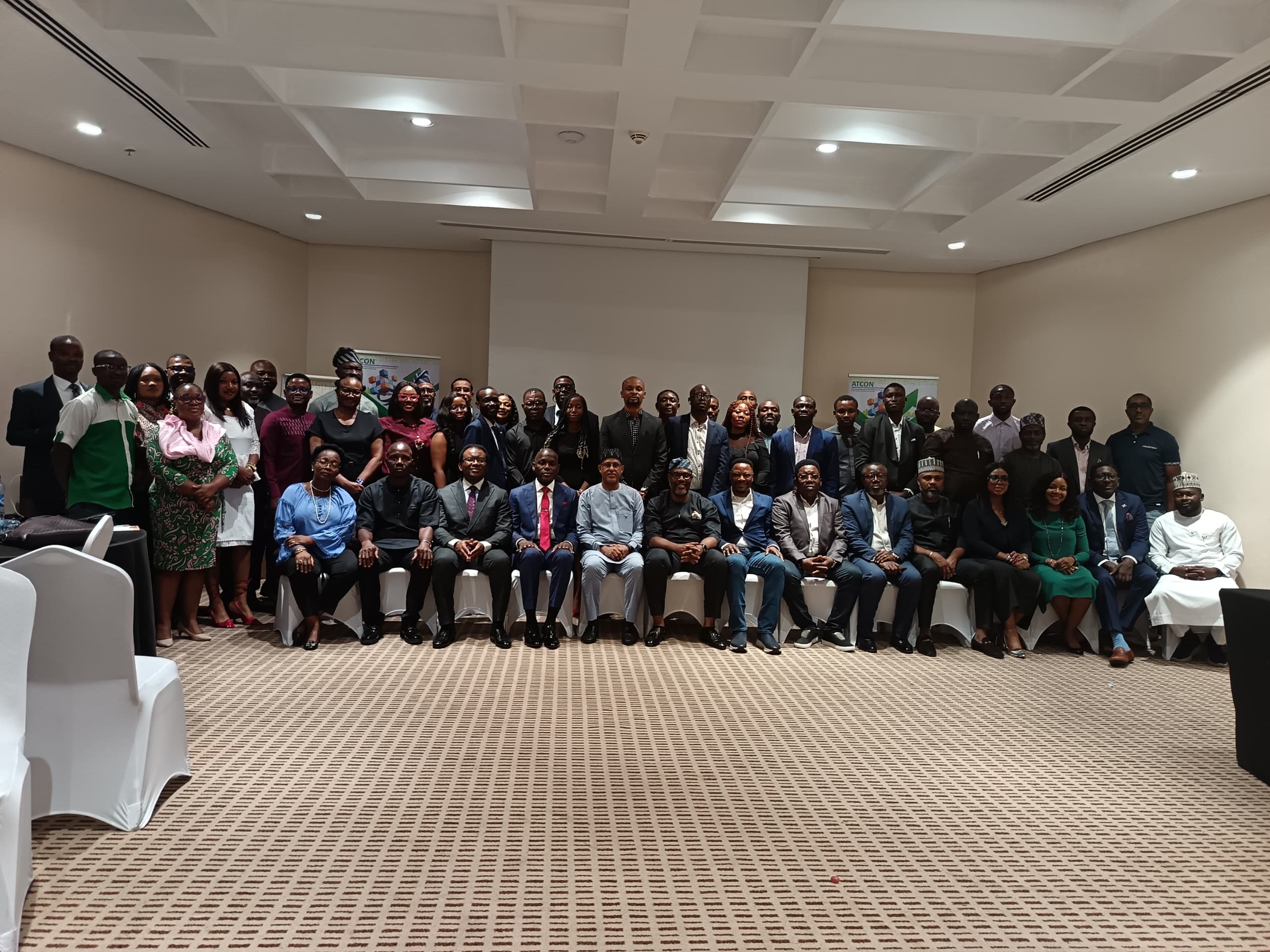Telecoms
ATCON Charts New Course to Tackle Infrastructure, Regulatory Bottlenecks, and Skills Gap
This year’s AGM, themed “Impact of Adjacent Agencies on the Nigerian Telecom Sector: The Way Forward,” sparked robust debate over what industry players described as the disruptive influence of non-core regulators.
Share this:
- Click to share on X (Opens in new window) X
- Click to share on Facebook (Opens in new window) Facebook
- Click to share on WhatsApp (Opens in new window) WhatsApp
- Click to share on Pocket (Opens in new window) Pocket
- Click to share on Telegram (Opens in new window) Telegram
- Click to email a link to a friend (Opens in new window) Email
- Click to share on LinkedIn (Opens in new window) LinkedIn
Published
9 months agoon

The Association of Telecommunications Companies of Nigeria (ATCON) has unveiled a renewed strategic agenda to tackle Nigeria’s persistent telecom infrastructure challenges, fragmented regulatory environment, and sector-wide brain drain.
The agenda was laid out during its 2025 Annual General Meeting (AGM) and National Executive Council (NEC) Elections held in Lagos on May 8, 2025.
Read Also:
Re-elected unopposed for a second two-year term, ATCON President, Mr. Tony Izuagbe Emoekpere, led wide-ranging discussions that addressed core operational disruptions, institutional reforms, and future-forward workforce development.
This year’s AGM, themed “Impact of Adjacent Agencies on the Nigerian Telecom Sector: The Way Forward,” sparked robust debate over what industry players described as the disruptive influence of non-core regulators.
According to Emoekpere, several unrelated government agencies have begun imposing levies and operational regulations on telecom operators, creating an unpredictable and hostile investment environment.
“We cannot operate in a climate where every agency seeks to charge the same operators for overlapping services,” he said.
Stakeholders called for a unified regulatory model to streamline oversight as many of them highlighted examples of regulatory duplication, with multiple state agencies issuing conflicting policies and fees. “It is not sustainable,” a participant warned.
Self-sabotage and need for unified code of conduct
Beyond government interference, participants acknowledged internal industry indiscipline. Former ATCON President, Engr. Ikechukwu Nnamani, lamented that sector fragmentation and unhealthy price wars had weakened collective bargaining power.
“We advocate for higher tariffs but undercut each other when it’s time to engage banks or major clients,” he said, calling for a united front in engagements.
In response, Emoekpere announced the formation of an Industry Think Tank Committee to develop engagement guidelines and standardise advocacy. “We must move from talk to structure,” he firmly stated.
New academy to tackle japa syndrome
To tackle Nigeria’s heavy reliance on foreign technical expertise and the continuing “Japa” brain drain, ATCON announced the creation of the ATCON Academy, a talent development initiative to train young Nigerians in telecom-related skills.
“The academy will equip our youth with technical skills while ensuring national economic advancement,” Emoekpere said, describing it as a strategic response to workforce gaps and overdependence on expatriates.
ATCON Vice President and CEO of the Internet Exchange Point of Nigeria (IXPN), Muhammed Rudman turned the spotlight on Nigeria’s failing education system and its weak alignment with telecom sector needs.
He criticised institutions like the Digital Bridge Institute (DBI) for underperformance, despite their resources.
Using India and Singapore as models, he urged the federal government to make decisive investments in human capital. “Nigeria has only seven unicorns. India produces 70–100 a year. We must do better,” he said.
He called for the creation of a dedicated ICT Think Tank to work with universities and bypass ineffective bureaucratic systems. “The President of Nigeria must make deliberate efforts. Advocacy alone won’t change this,” he concluded.
The consensus of the operators tilted in favour of operating an open-door system by telecom companies to accommodate as many interns as possible with the aim of widening the base for employable candidates in the country.
They further argued that while universities and institutions of learning may lack the means to expose students to maximum practical experience, players in the sector should step in to fill the gap by collaborating the with the institutions to overhaul curriculum and bring industry knowledge to bear.
Pledge for swift action on infrastructure and legislative advocacy
Meanwhile, President Emoekpere pledged to lead the new ATCON executive team in repositioning the association for greater advocacy and industry impact.
Central to his mandate is addressing the alarming state of telecoms infrastructure, especially fibre cuts and the weak implementation of the Critical National Information Infrastructure (CNII) legislation.
“President Bola Ahmed Tinubu promulgated the CNII Bill last year, but enforcement remains poor. As an advocacy group, we want immediate implementation to safeguard telecom infrastructure nationwide,” he said.
To this end, ATCON announced that it would engage state and federal agencies—particularly Ministries of Works and road contractors—at its next policy forum involving ICT Commissioners from all 36 states to push for full CNII compliance.
Share this:
- Click to share on X (Opens in new window) X
- Click to share on Facebook (Opens in new window) Facebook
- Click to share on WhatsApp (Opens in new window) WhatsApp
- Click to share on Pocket (Opens in new window) Pocket
- Click to share on Telegram (Opens in new window) Telegram
- Click to email a link to a friend (Opens in new window) Email
- Click to share on LinkedIn (Opens in new window) LinkedIn
You may like


ipNX Shines at ATCON Inaugural Telecoms Excellence Awards


Nigeria’s MVNO Market Faces Early Shakeout, Experts Predict


Beyond CNII: Telecom Experts Propose Next-level Infrastructure Protection Measures


Telecoms Service Disruption Looms in Lagos, Ogun – ATCON


Starlink Faces Regulatory Huddles in Nigeria over Price Hike


ATCON Inducted as Pioneer Member of Federation of African Digital Businesses












